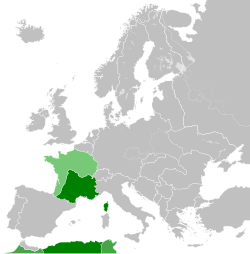Vichy France
French State État français | |||||||||
|---|---|---|---|---|---|---|---|---|---|
| 1940–1944 | |||||||||
| Motto: Travail, Famille, Patrie ("Work, Family, Fatherland") | |||||||||
| Anthem:
"Maréchal, nous voilà!" (unofficial) ("Marshal, here we are!") | |||||||||
 The French State in 1942:
| |||||||||
| Status | Puppet state of Nazi Germany | ||||||||
| Capital | Vichy | ||||||||
| Demonym(s) | French | ||||||||
| Government | Collaborationist regime under a unitary authoritarian dictatorship | ||||||||
• President (Marshall) | Philippe Pétain | ||||||||
| Pierre Laval | |||||||||
| ISO 3166 code | FR | ||||||||
| |||||||||
The Vichy France, officially the French State, was the government of France during the early 1940s. It included all of France except for Alsace-Lorraine. It also governed the French colonial empire. The state was led by Philippe Pétain. He had been notable for helping to win World War I.
When the French and the British armies lost the Battle of Dunkirk, and the rest of the Battle of France was being lost, the French Parliament made Pétain Minister. He negotiated an armistice with Germany. He agreed that France would be neutral in World War II. He became head of state and ruled as a dictator. He usually did what the Germans told him to do.
The Axis powers militarily occupied northern and western France. They also controlled part of the southeastern part of the country. The Vichy government, as a client state of Germany, controlled the Free Zone, the unoccupied parts of France. In November 1942 the United States joined the North African Campaign by invading French North Africa, so the Vichy army occupied the Vichy zone. In 1943, the Vichy government, now a puppet state, moved to Paris. In 1944, it moved to Germany. The government disbanded in 1945 with the defeat of Nazi Germany.


